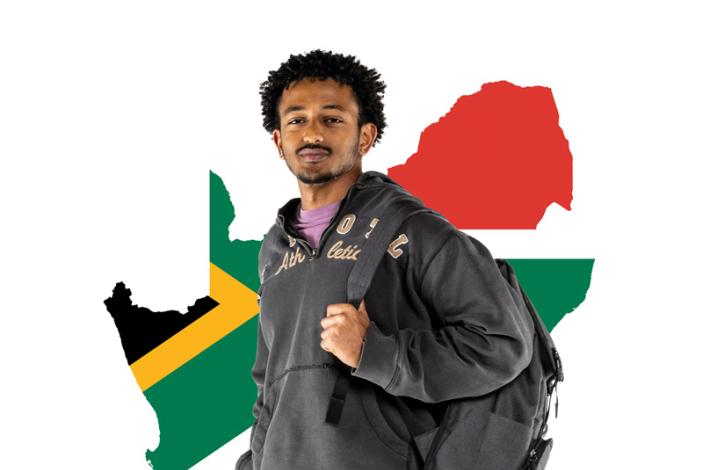
Exchanging ideas abroad

Nez Redi arrived at Mizzou in 2020. “I come from a background where there’s one car in the whole village. I’m now in the land of opportunity.” Photo by Abbie Lankitus
This article originally appeared in the Winter 2024 issue of Mizzou Magazine.
Nez Redi has always been a person of action. Upon arrival at Mizzou in 2020, Redi quickly switched majors from mechanical engineering to finance because he wanted to stop studying for the future and start his career as an entrepreneur immediately. When he launched an online clothing brand, VSNFirst, he wanted it to matter. He donated a percentage of the profits to help build schools back in his native Ethiopia.
So, when Redi learned of the student exchange program Entrepreneurs Without Borders, which sends Trulaske College of Business students to South Africa, he jumped at the opportunity. “I moved from Ethiopia to Kansas City at age 10,” Redi says. “I come from a background where there’s one car in the whole village. I’m now in the land of opportunity. We get caught up in things and lose sight of the big scope. So many people out there can use my help.”
Entrepreneurs Without Borders is a pilot program between Trulaske and the University of the Western Cape (UWC). In July, Redi and classmate Michael Moriarty flew to Cape Town for a two-week stint, and this winter, two South African students will come to Columbia. The goal is to work with other student entrepreneurs, exchange ideas, experience different business climates and, hopefully, dispel any misconceptions about the nature of business in either nation.
“The campuses and countries are different,” says Scott Christianson, associate teaching professor and director of the Center for Entrepreneurship and Innovation, which sponsors the program. “There they are focused on more sustainable developmental goals to meet significant challenges that are going on in neighboring countries and in South Africa itself. I believe entrepreneurship is how we’ll solve a lot of the world’s problems.”
Christianson says that Trulaske has had a long-standing relationship with UWC, each school having informally hosted faculty members from the other. He wants this program to be a two-way exchange for students to not only broaden their respective worldviews but also their business contacts. “The illusion of a business founder alone in their garage is a myth,” Christianson says. “Entrepreneurship is not about an idea; it’s about execution, and that means bringing in people to help you. The best founders are coachable and seek our help and advice from a diverse background of folks.”
Redi says he returned to Missouri and is now focusing on launching software for independent gym owners with a renewed focus, a larger global network and an even greater drive. “When you take a step back, you realize how urgent the need is,” he says. “I want to be there now. I made a bunch of contacts with key players in South Africa. I shared my vision and goals. And they gave me the same advice: Just start.”